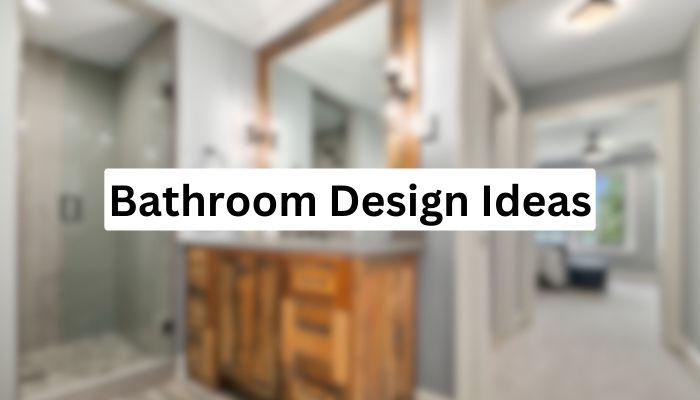

Transforming your bathroom into a modern sanctuary with bathroom ideas that combines aesthetics, functionality, and innovation. Whether you’re contemplating a full renovation or seeking inspiration to refresh your space, the world of bathroom design is brimming with ideas to create a contemporary, stylish, and practical area in your home. This guide delves into the latest trends and timeless concepts in bathroom design, focusing on creating spaces that not only meet the practical needs of daily life but also serve as personal retreats for relaxation and rejuvenation.
In the realm of home design, the bathroom has evolved from a purely functional space to a haven of tranquility and style. Modern bathroom design ideas blend form with function, incorporating sleek lines, innovative materials, and smart layouts to create spaces that are both beautiful and practical. From luxurious freestanding baths to efficient use of small spaces, contemporary bathroom design offers a plethora of options to personalize your space, reflecting your unique style while meeting your daily needs.
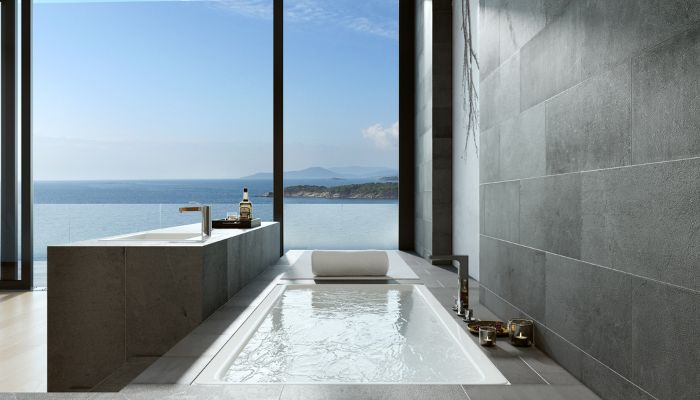
Contemporary bathroom design is characterized by clean lines, minimalistic decor, and a neutral color palette accented with bold textures and patterns. Glass shower doors, double vanities, and wet rooms are hallmark features that combine luxury with functionality, offering a spa-like experience in the comfort of your home. Incorporating elements like floor-to-ceiling stone, green tile, and subway tile can add texture and color, transforming the bathroom walls into focal points of interest and beauty.
A double vanity is more than just a trend; it’s a design solution that enhances both the functionality and aesthetics of a bathroom. Ideal for ensuite and primary bathrooms, double vanities provide ample counter space and storage, allowing multiple users to utilize the bathroom simultaneously without compromising on comfort or style. Matching sinks, paired with sleek plumbing fixtures, not only cater to the practical needs of a modern household but also add a touch of elegance to the bathroom design.
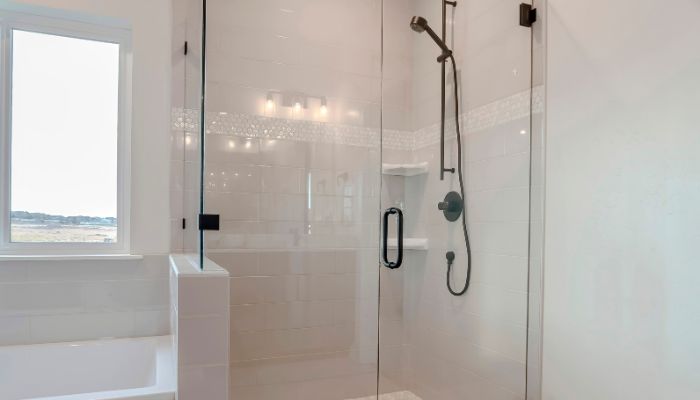
Incorporating glass shower doors is a smart way to maximize space and light in both large and small bathrooms. They create an open, airy feel, allowing natural light to permeate the space and making even the smallest room appear more spacious. For bathrooms lacking in natural light, such as windowless bathrooms, glass doors can help reflect artificial lighting, enhancing the overall brightness and sense of space.
A wet room, with its seamless floor-to-ceiling design, offers an uncluttered, sleek look that is both luxurious and accessible. This design eliminates the need for shower trays and curtains, providing an open and fluid space that is easy to clean and maintain. Wet rooms are particularly beneficial in small bathrooms, as they maximize the available wall space and can make the room appear larger.
A freestanding bathtub is the epitome of luxury and a key feature in modern bathroom design. It serves as a stunning centerpiece, inviting relaxation and indulgence. Whether positioned as a focal point in a large bathroom or cleverly integrated into a smaller space, a freestanding bathtub adds a touch of elegance and sophistication, reminiscent of a luxury hotel feel.
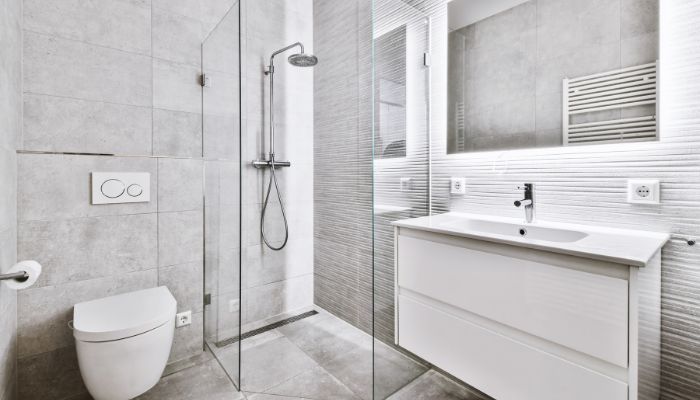
In contemporary bathroom design, the efficient use of space and light plays a crucial role in creating a comfortable and inviting atmosphere. For small bathrooms, maximizing vertical space with wall-mounted fixtures and using light colors like white tiles can make the room feel larger and more open. Incorporating elements such as a pedestal sink or a freestanding vanity can free up floor space, while smart storage solutions ensure that every item has its place, reducing clutter and enhancing the sense of spaciousness in small space.
Natural light is a coveted feature in any bathroom, promoting a sense of well-being and connection to the outdoors. In spaces where large windows are not feasible, skylights or frosted glass can provide privacy while allowing light to flood the room. For windowless bathrooms, creative lighting design, including the use of pendant lights and strategically placed mirrors, can mimic the effect of natural light, creating a bright and welcoming space.
In any bathroom, lighting plays a pivotal role in setting the mood and enhancing functionality of guest bathroom. Pendant lights and carefully positioned fixtures can transform a bathroom, providing ample illumination for tasks while offering the flexibility to create a relaxed ambiance with dimmer switches. For bathrooms lacking in natural light, innovative lighting solutions can simulate daylight, making the space feel vibrant and lively.
The choice of color in a bathroom can significantly affect its atmosphere. An all-white bathroom exudes a sense of cleanliness and space, while black and white tile offers a classic contrast that adds depth and character. For those looking to introduce a pop of color, green tiles or patterned wallpaper can infuse the room with energy and personality. The use of color, whether on bathroom walls or through accents, allows for personal expression and can transform the space into a reflection of your style.
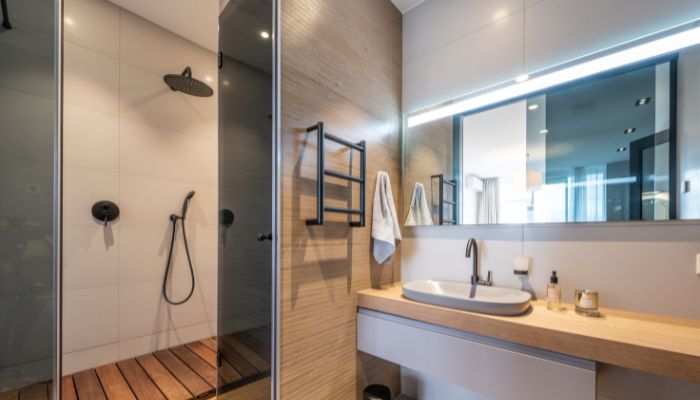
In the interior design, of a small bathroom or powder room, every inch counts. Choosing the right layout and fixtures can make a significant difference in maximizing space and enhancing functionality. A corner sink, a wall-mounted toilet, or a compact shower can free up valuable floor space, making the room appear larger and more open.
Smart storage solutions are essential in keeping a bathroom organized and clutter-free. Recessed shelving, mirrored cabinets, and vanity drawers offer ample storage without encroaching on valuable space. For added flexibility, consider using vertical space for storage, with tall cabinets or open shelving that can keep essentials within reach without overwhelming the room.
The selection of materials in a bathroom is crucial for ensuring longevity and maintaining style. Floor-to-ceiling tiles, whether subway tiles or more exotic patterns, offer water resistance and ease of cleaning. For countertops and vanities, materials like quartz and natural stone provide durability and a touch of luxury. When selecting flooring, consider porcelain tiles for their strength and water resistance, ensuring your new bathroom also remains timeless and functional for years to come.
Incorporating different textures and patterns can add depth and interest to a bathroom. A textured wall, whether through stone, tile, or wallpaper, can create a focal point for primary bathroom, while patterned floor tiles can add dynamism to the space. The key is to balance these elements, ensuring the bathroom remains a serene and harmonious space.
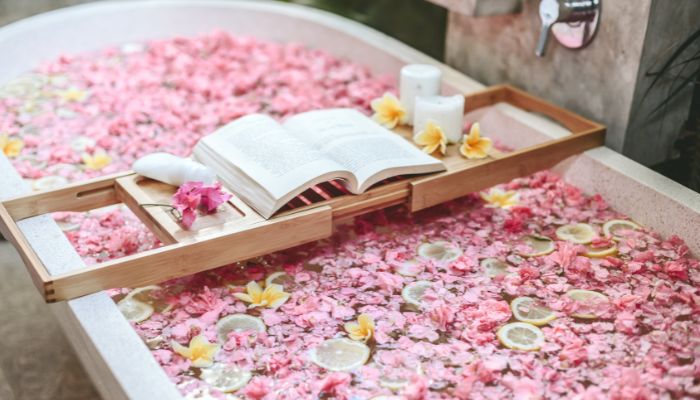
A freestanding tub is more than a bathing facility; it’s a statement piece that can define the bathroom’s aesthetic. Positioned as the centerpiece of the room, a freestanding bathtub not only offers a luxurious soaking experience but also contributes to the bathroom designs overall design, evoking a spa-like feel that can turn the bathroom into a personal retreat.
Incorporating spa features into a bathroom can elevate the experience from mundane to extraordinary. A walk-in shower with a rainfall showerhead, a deep soaking tub, or even a small fireplace can create an ambiance of luxury and relaxation in small bathroom. For those with more space, a dressing table or a comfortable chair can add an element of sophistication, making the bathroom not just a place for grooming but a sanctuary for relaxation.
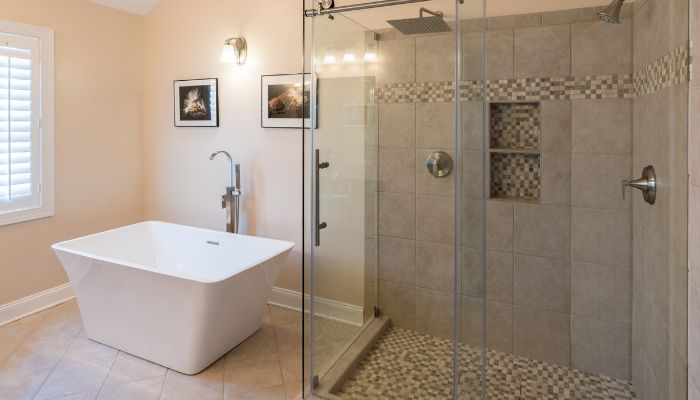
Incorporating unique features such as a fireplace in the bathroom can transform the space into a cozy retreat, perfect for unwinding after a long day. Similarly, the addition of a dressing table within the bathroom layout provides a luxurious space for personal grooming, blending functionality with elegance. These features not only serve practical purposes but also add a distinctive character to extra space in the bathroom, making it uniquely yours.
Accents like black grout with white tiles can create a striking contrast in wall space, adding depth and interest to the bathroom’s overall design. Similarly, the use of patterned wallpaper or bold color accents on bathroom walls can inject personality and vibrancy into the space. These decorative touches allow for endless creativity, enabling you to tailor the bathroom’s aesthetic to your personal style.
In small bathrooms, the challenge lies in maximizing space without sacrificing style. Solutions such as pedestal sinks, which take up less floor space, and glass doors for showers, which create an illusion of openness, are essential for making the most of limited square footage. Additionally, incorporating extra storage in unexpected places, like over the sink and toilet or in recessed wall niches, can help keep the space organized and clutter-free.
For larger bathrooms, the focus shifts to creating a functional and cohesive layout that balances open spaces with functional zones. Freestanding bathtubs can serve as a luxurious focal point, while walk-in showers emphasize openness and accessibility. The strategic placement of vanities, toilets, and storage can create a seamless flow within the room, ensuring that each area is both accessible and aesthetically pleasing.
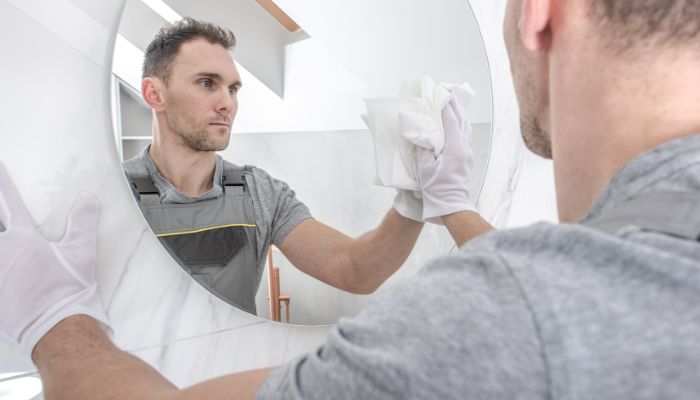
Choosing the right accessories, from towel bars to soap dispensers, can significantly impact the bathroom’s functionality and style. Opting for fixtures and accessories that complement the overall design theme can unify the space, while also providing convenience and enhancing the user experience. Consider selecting eco-friendly and high-quality materials that offer durability and contribute to a sustainable lifestyle.
The right lighting can transform the bathroom, creating an ambiance that ranges from bright and invigorating to soft and relaxing. Incorporating a mix of lighting types, such as overhead lighting for general illumination, task lighting near mirrors for grooming, and accent lighting to highlight architectural features or artwork, interior designer can create a dynamic and flexible space. The use of dimmer switches allows for adjustable lighting levels, catering to different moods and needs throughout the day.
In conclusion, crafting a contemporary bathroom that resonates with personal style and meets functional needs is an artful balance of design, innovation, and practicality. By integrating modern elements such as sleek fixtures, smart storage solutions, and dynamic lighting, alongside thoughtful material selection and strategic space utilization, homeowners can create spaces that are not only aesthetically pleasing but also supremely functional. Whether through the incorporation of bold patterns and textures, the strategic use of light and color, or the addition of unique features and eco-friendly technologies, each choice plays a pivotal role in transforming the bathroom into a sanctuary of comfort and style. This guide has navigated through the essentials of contemporary bathroom design, offering inspiration and ideas to elevate any bathroom space into a modern oasis of relaxation bathroom inspiration, and personal expression.
A1: Utilize light colors, incorporate mirrors to reflect light, choose glass shower doors to open up the space, and employ smart storage solutions to reduce clutter.
A2: A double vanity offers ample counter space, provides more storage, and allows multiple people to use the bathroom simultaneously, enhancing functionality and convenience.
A3: While freestanding baths are often seen as luxury items for larger bathrooms, compact models can fit into smaller spaces, offering elegance without compromising on space.
A4: Lighting is crucial in bathroom design, affecting both functionality and ambiance. Layered lighting solutions can cater to various needs and moods, making the bathroom versatile and comfortable.
A5: Absolutely. Eco-friendly fixtures not only reduce water and energy consumption but also come in modern designs that enhance the bathroom’s aesthetics while being environmentally responsible.
A6: Incorporate elements that reflect your personal style, such as unique tiles, your favorite color schemes, or custom artwork. Personal touches make the space truly yours.
A7: Yes, consulting with an interior designer can provide you with professional insights, innovative ideas, and access to materials and fixtures that you might not find on your own, potentially saving you time and money in the long run.
A8: To future-proof your bathroom, opt for timeless design elements and high-quality materials that can withstand trends and wear. Incorporate adaptable features, such as walk-in showers and versatile lighting systems, and consider the evolving needs of your household to ensure the space remains functional and stylish for years to come.
A9: Porcelain tiles are often considered the best flooring option for contemporary bathrooms due to their durability, water resistance, and wide range of designs. They can mimic natural stone or wood while offering the practical benefits needed for bathroom environments. Additionally, heated flooring can add a touch of luxury and comfort.
A10: Selecting the right color scheme depends on the size of your bathroom and the ambiance you wish to create. Light, neutral colors can make a small bathroom feel larger and brighter, while dark or bold colors can add depth and character to a larger space. Consider the mood you want to set; for example, blues and greens can create a calming effect, while warmer tones can add coziness. Always test paint colors in your bathroom’s lighting before making a final decision.